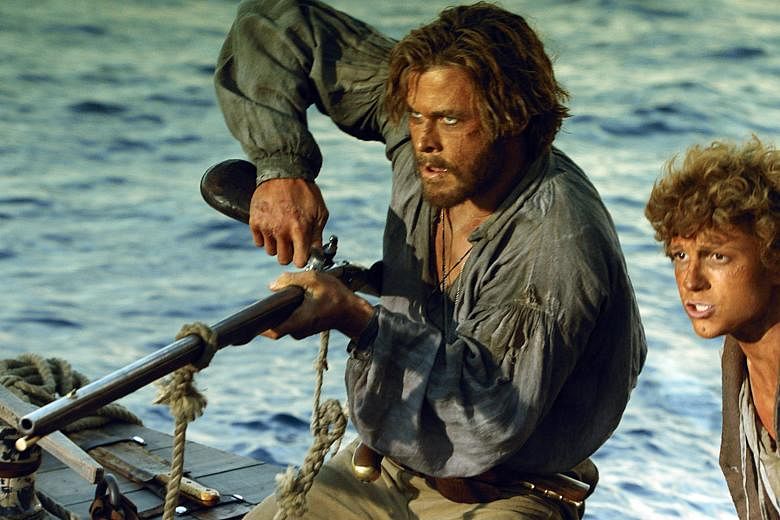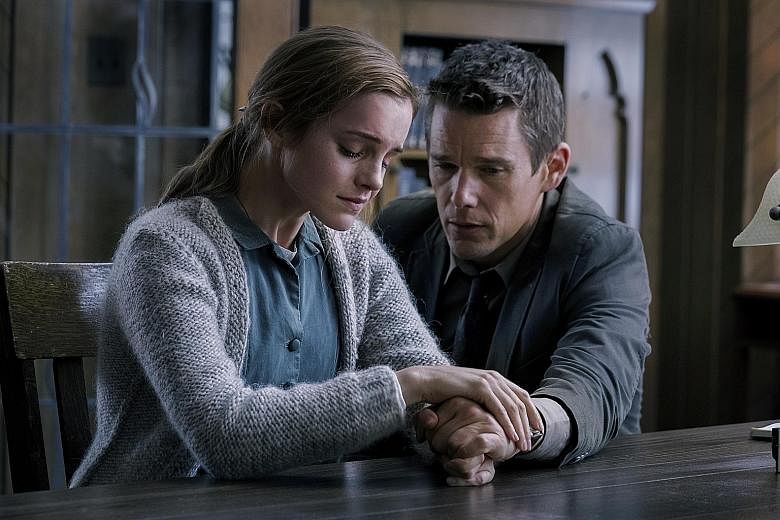Ron Howard is the kind of director whose work is especially vulnerable to bad scripts.
As a helmer, he has an affinity for stories about ordinary guys who push past their own limits - in the comedy Splash (1984), the space drama Apollo 13 (1995) or the Oscar-nominated Cinderella Man (2005), his directing style and script were a magic match.
But In The Heart Of The Sea (PG13, 121 minutes, opens tomorrow, 2.5/5 stars) a soggy tale of 19th-century whalers in trouble, Howard sets sail with a screenplay lacking a compass and runs aground soon after.
Co-writer Charles Leavitt cribs first from Mutiny On The Bounty's (1962) officer-versus-officer conflict. When the giant whale appears, the narrative becomes a monster hunt, before shifting into a man-versus-nature story.
In one typically ham-fisted bit of foreshadowing, Peggy (Charlotte Riley), wife of first mate Owen Chase (Chris Hemsworth), begs him to stay home because she has a bad feeling about the expedition.
In that scene and in too many others, Howard lets the beats play on too long. Other sections, especially ones that sell this as an action-adventure, fail to have anything fresh to say.
Like an insecure tour guide, the movie likes to announce at regular intervals that it is based on the true events that inspired Herman Melville's classic, Moby Dick.
In scenes that never happened in real life, Melville (Ben Whishaw) records the memories of surviving whaler Thomas Nickerson (Brandon Gleeson); the movie is Nickerson's flashback.
The Melville portions add nothing to the story, but it is likely they exist because producers feared no one would care about a forgotten naval incident unless they can relate it to a book they read in high school.
Howard's 19th century has the idealised warmth of a Dickens Christmas special while Hemsworth's accent wanders from Sydney to London with side trips to Boston. He is an actor of limited range given too much to do.
The more the movie makes Chase the focal point, the more its period feel ebbs away. Like Keanu Reeves in Bram Stoker's Dracula (1992), Hemsworth is in the wrong place and, worse, in the wrong time.
A year before he played Dracula's Jonathan Harker as a Californian surfer dude, Keanu Reeves was perfectly cast in 1991's Point Break. He was Johnny Utah, an undercover cop insinuating himself into a gang of bank-robbing surfers led by hippie-anarchist Bodhi (Patrick Swayze).
The rebooted Point Break (NC16, 114 minutes, opens tomorrow, 3/5 stars) keeps the jocks-with-guns pastiche, but increases the sports element by a bro-tastic factor of 100.
There is motocross, mountaineering and wingsuit flying. The movie practically sweats Red Bull.
Some of the charming ridiculousness of the original is retained. The movie asks that you believe that somewhere in the world, there are high-fiving, chest-bumping adrenalin junkies who also happen to be eco-warrior socialists. Edgar Ramirez's Bodhi is less charismatic hippie, more scary cult leader, prone to statements about "honouring nature" and "completing the cycle of eight". Luke Bracey's Johnny Utah has Reeves' blankness, without the suggestion of inner depths.
Trivia note: Before production house RGM Group was sued by the Singapore Government for failing to make movies after taking public funds, it had plans for a Point Break sequel, with action scenes set in Singapore.
Close your eyes and imagine the bros base-jumping off Marina Bay Sands while mouthing koans about wealth redistribution and mangrove protection. On second thought, perhaps it's for the best that the movie never happened.
Another work that should have remained in limbo is Regression (NC16, 107 minutes, opens tomorrow, 1.5/5 stars).
In this based-on-a-true-story horror work written and directed by Spanish film-maker Alejandro Amenabar, Emma Watson's Angela claims to have been abused by Satanists in her small Minnesota town, while Ethan Hawke plays a detective with a troubled past trying to separate fact from fantasy.
Amenabar's bent for Gothic excess, which worked well in period piece The Others (2001), is out of place in a modern setting.
Visual murkiness, omens, dreams and flashbacks intrude at every opportunity, as secondary characters argue with Hawke's cop about the nature of good and evil.
This is a college essay about religion dressed up as drama. Grade: F.




